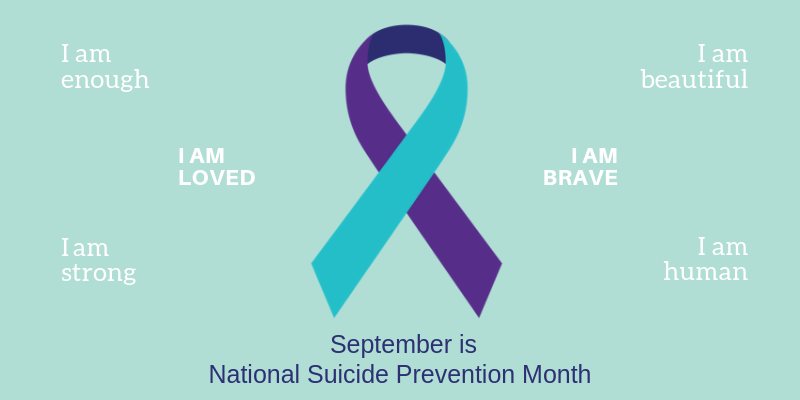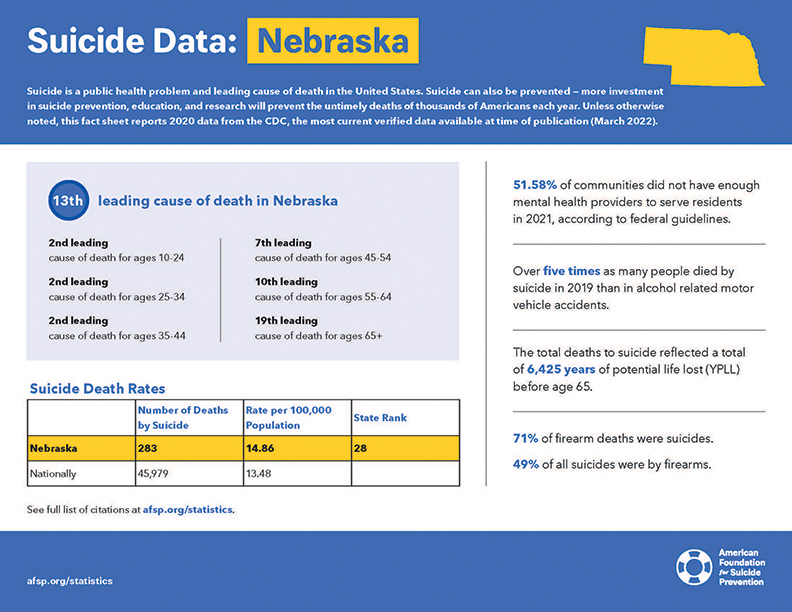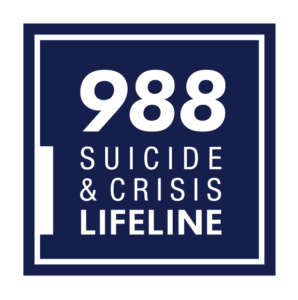Preventing Suicide: Learn the Warning Signs and Risk Factors

September is dedicated to suicide awareness and prevention. During September and all year long, we aim to raise awareness and help educate people on how to prevent suicide in their area. Preventing suicide can feel like an impossible task. Especially when suicide is the 2nd leading cause of death for 10-44 year olds in Nebraska. To help protect you and those close to you from this tragic public health issue, it’s important to understand the warning signs and risk factors of suicide and the ways you can help prevent it.
Download this free mental health assessment to determine if your teen could benefit from a professional’s help.
Provided by the American Foundation for Suicide Prevention
Warning Signs of Suicide
These warning signs indicate that someone may need immediate help. These signs can be verbal or something displayed through a person’s behaviors.
Talking about:
- Killing themselves
- Wanting to die
- Feeling hopeless or worthless
- Feeling like they have no purpose in life
- Unexplainable and/or unbearable pain
- Feeling like there’s no point to life
Behaviors:
- Drastic changes in behavior, such as struggling with depression but suddenly displaying a surge of happiness or eagerness
- Increased alcohol and/or drug use
- Changes in sleeping and/or eating habits
- Withdrawn from family, friends and/or activities
- Displaying changes in their mood, such as increased anxiousness, anger or other extreme mood changes
- Engaging in risky behavior or activities
Risk Factors for Suicide
- Prior suicide attempt(s)
- Family history of suicide
- Experiencing trauma (such as abuse, neglect, the death of a loved one, bullying, and more)
- Recent job or financial loss
- Easy access to lethal means
- Family history of mental illness, depression, alcohol and/or drug misuse
- Chronic pain or physical medical conditions
- Exposure to others who have died by suicide (in real life or via the media and Internet)
- Lack of social support and sense of isolation
- The stigma associated with asking for help
- Lack of health care, especially mental health and substance misuse treatment
What You Can Do to Prevent Suicide
Everyone has a role to play in preventing suicide. Increasing the connections among family members and others in your circle of reach can play a major role in preventing suicide, according to the Suicide Prevention Resource Center. Research also shows that people having thoughts of suicide can experience relief when someone simply reaches out to them and inquires about their feelings. Connecting your loved one to a support system, such as a hotline, family member, friend or therapist, has shown to be effective in preventing suicide.
Being aware of the warning signs and risk factors above will help you identify when friends, family or someone you know starts to exhibit these behaviors. In many communities, suicide carries a negative stigma that prevents some people from seeking help. Keep an open mind when talking to others about their feelings and make sure not to promote this stigma. Also, be encouraging when urging someone to seek help, whether through a mental health professional, a visit to the emergency room or by calling the Suicide and Crisis Lifeline at 988.
In July 2022, the Federal Communication Commission (FCC) created a new 3-digit dialing code to connect callers to the Suicide and Crisis Lifeline for mental health crises. Just like we’re trained from childhood to call 911 for immediate assistance with fire, health, or safety emergencies, now 988 is designed to be a resource for immediate mental health emergencies, people at risk of suicide and other crises. You can call, text, or chat online and receive help immediately.
Previously, the Suicide and Crisis Lifeline was an eleven-digit 1-800 number. In shifting to a three-digit code, there’s hope that reaching out for mental health emergencies will become a routine, destigmatized response to mental health crises.
About KVC Nebraska
We all need connection. That’s why KVC Nebraska has been serving children, individuals and families for more than 10 years. We have made a positive difference in the lives of thousands children, adults and families by providing in-home family support, behavioral healthcare, foster care, home-based support for people with disabilities, adoption and substance use treatment. See how you can access our child and family therapy and/or substance misuse treatment programs.


